“For the first three months, the baby is just blood. There’s nothing there to take care of,” said one Kenyan father-to-be in Kakamega County, Western Kenya, where we were meeting with communities and health care providers to learn about their attitudes toward women’s health, pregnancy and care at health facilities.
“A baby is a blessing from God,” said the mother-in-law of a pregnant woman during another community discussion. “He alone knows how it grows.”
Using insights from these community discussions, Management Sciences for Health (MSH) worked with M4ID, a social impact design company specializing in development and health, to develop a group antenatal care model that meets the needs of young women, adolescent girls (ages 10–24), and health care providers. With support from the UK’s County Innovation Challenge Fund program, the Lea Mimba project (“take care of your pregnancy” in Swahili) used a human-centered design approach to adapt a successful pregnancy club model that MSH and M4ID developed in the Eastern Ugandan communities of Mbale and Bududa in 2016.
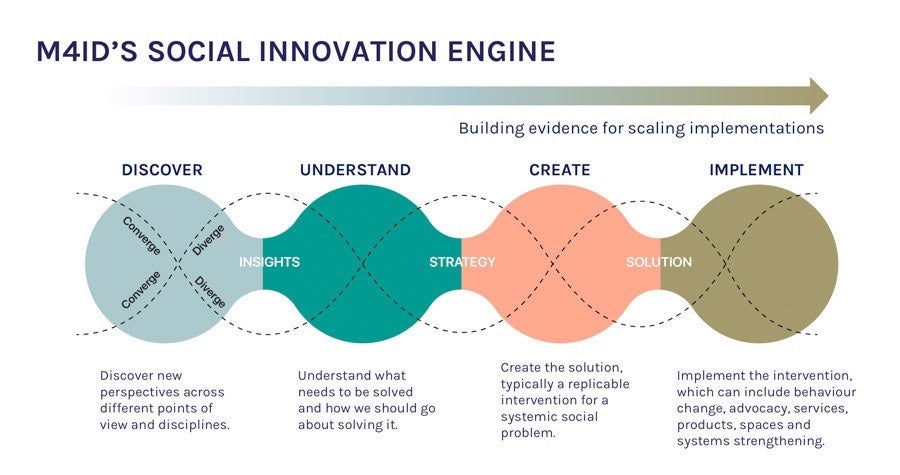
From traditional to group antenatal care
Starting antenatal care early in pregnancy is critical for protecting the health and wellbeing of women and their babies, but in Western Kenya, only about 20% of pregnant women attend their first visit before the fourth month of pregnancy (DHS 2014). Through antenatal care visits, health care providers can detect and treat pregnancy-related complications, such as pre-eclampsia and anemia, before they become life-threatening. Antenatal care visits provide opportunities for health care providers to encourage women to deliver their babies with the help of skilled birth attendants and to promote breastfeeding and other healthy postnatal behaviors.
However, traditional one-on-one antenatal care often does not meet women’s and adolescents’ needs for information, support and high-quality clinical care. In Kakamega County, women often must wake up around 7:00 AM to go to the clinic, only to spend most of their time there in the waiting room. During standard antenatal care visits, providers spend between 10 and 15 minutes with each woman, but adolescents and those who are pregnant for the first time may need additional time to learn and understand health information.
In recent years, group care models have emerged in low-income countries as a promising approach to provide high-quality antenatal care and promote social support among women during pregnancy. Women go through pregnancy as a cohort, learning through discussion and building bonds with one other and their antenatal care providers.
Community perceptions of pregnancy and health care
We asked community members, potential clients and providers how women experience pregnancy and health care in their communities and how providers deliver that care.
Several barriers continue to disrupt women’s and adolescents’ access to care, including a lack of high-quality services and information, limited individual and community awareness and support and low male engagement. Several actors —including recently pregnant peers, midwives, community health volunteers, male partners and mothers-in-law— influence a woman’s decision to use antenatal care services. Peers are an important early source of information, as doctors and other authority figures are considered difficult to approach. Mothers-in-law might uphold traditional, cultural beliefs that prevent suggested behavior change, while male partners provide the money or transportation to visit the clinic. We learned that pregnancy is only socially acknowledged toward the end of the second trimester, which deters women from going a health facility early in their pregnancy.
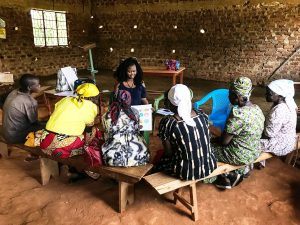
While all of these influencers care about the baby’s health, they generally believe the woman’s health is secondary. Our research highlighted the critical need to help community members understand the link between antenatal care and a woman’s and baby’s health.
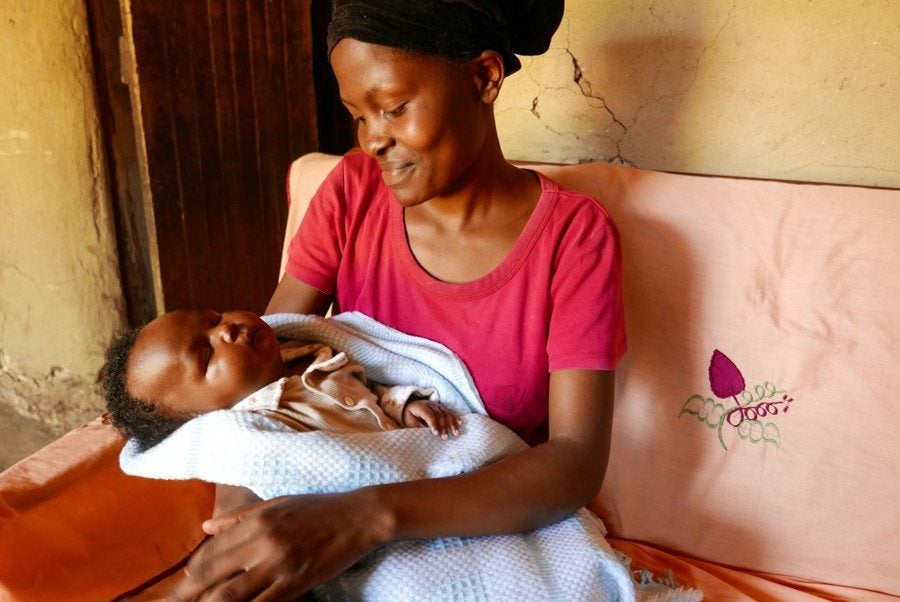
Co-creating pregnancy clubs with women and providers
When designing the group antenatal care model in Kenya, as in Uganda, we wanted to ensure that it improved the pregnancy and birth experience of the women participants, while enhancing — not burdening — the workflow of the health care providers. As a result of these discussions, and building on our experience forming groups in Uganda, we engaged women and providers in the creation of the Lea Mimba pregnancy club in Kenya.
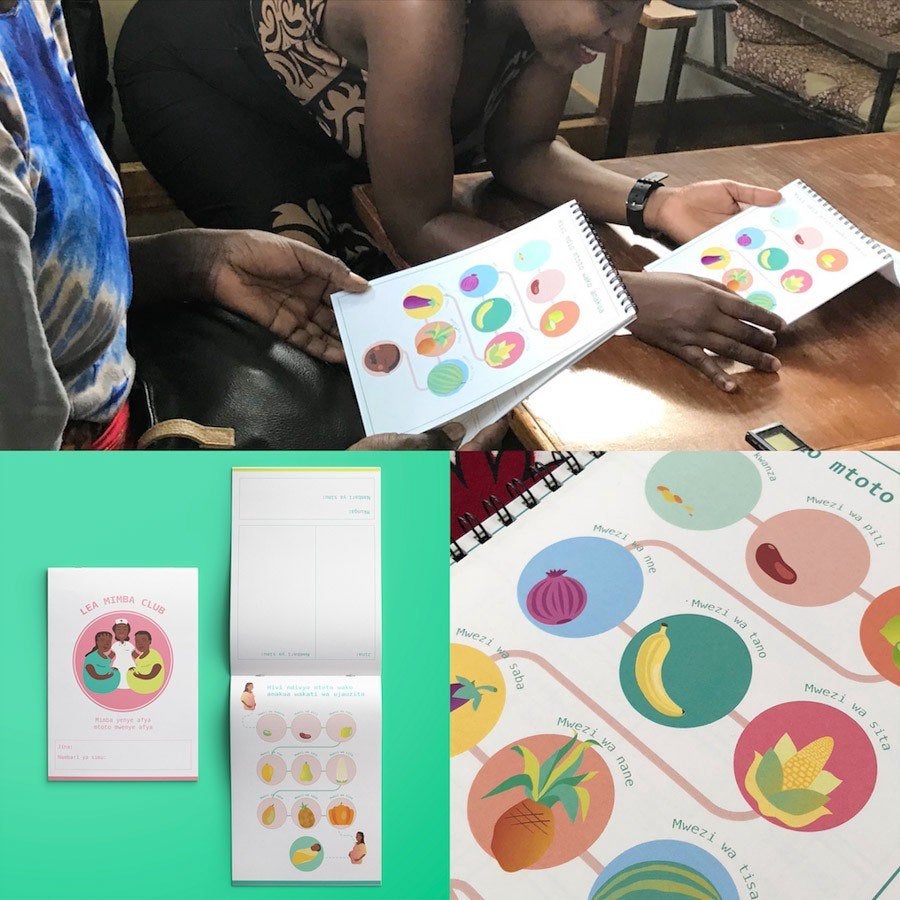
We adapted the Uganda group antenatal care curriculum to comply with national standards and guidelines for maternal and newborn health while meeting the current World Health Organization recommendations of eight antenatal care contacts. We also incorporated elements of self-care where women participate in taking their weight and recording their blood pressure, and facilitators encouraged women to build relationships and meet with club members outside of group sessions. To support the group model, we collaborated with local midwives and health care staff to develop a package of implementation materials that can be adapted for use in other settings, including a training curriculum; health care provider job aids; visual and tactile materials; supervision and monitoring tools and community engagement tools.

We observed and requested feedback from women and providers who participated in mock pregnancy club sessions. Participants commented on their experiences engaging in or leading the sessions, their understanding of the health topics and the usefulness and relevance of the implementation materials. During these sessions, we noticed that some women were initially quiet, but they became more involved when health care providers told stories or invited participants to sing songs that convey health messages. Women passed around a ball to indicate their turn to speak, and at times, even asked for the ball.
After these mock sessions, participants continued to talk about what they learned as they waited for their individual appointments with midwives. They agreed that it would be easiest to attend sessions on market days, and midwives recommended that sessions take place in the afternoon when clinics are less crowded. Midwives noted that the group format also saved them time, as they could share more advice and information than was possible during one-on-one antenatal care appointments. Based on these observations and comments from the mock session participants, we revised the session structure and accompanying materials.
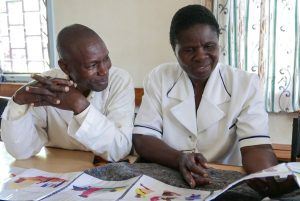
Pregnancy clubs in session
We have started pregnancy clubs in six facilities in Kakamega County. Groups comprise eight to 10 women of similar gestational ages, and we emphasize that each club session is a confidential and safe space for women to talk about their pregnancies, even if they are not yet ready to declare their pregnancy to the community.
As health facilities host pregnancy clubs, we will continue to engage community members in discussions on the importance of antenatal care for all women and babies and encourage them to refer women to their local Lea Mimba pregnancy club.
To learn more about our work, visit msh.org and stay up to date with MSH by subscribing to our email series.
Listen to the Lea Mimba Pregnancy Club Song: Lea Mimba Club participants sing a song with the message that healthy pregnancies ensure children’s health. Recording by M4ID.
Photo credit: M4ID
—
This post originally appeared on Medium.
Read more about group antenatal care>>
